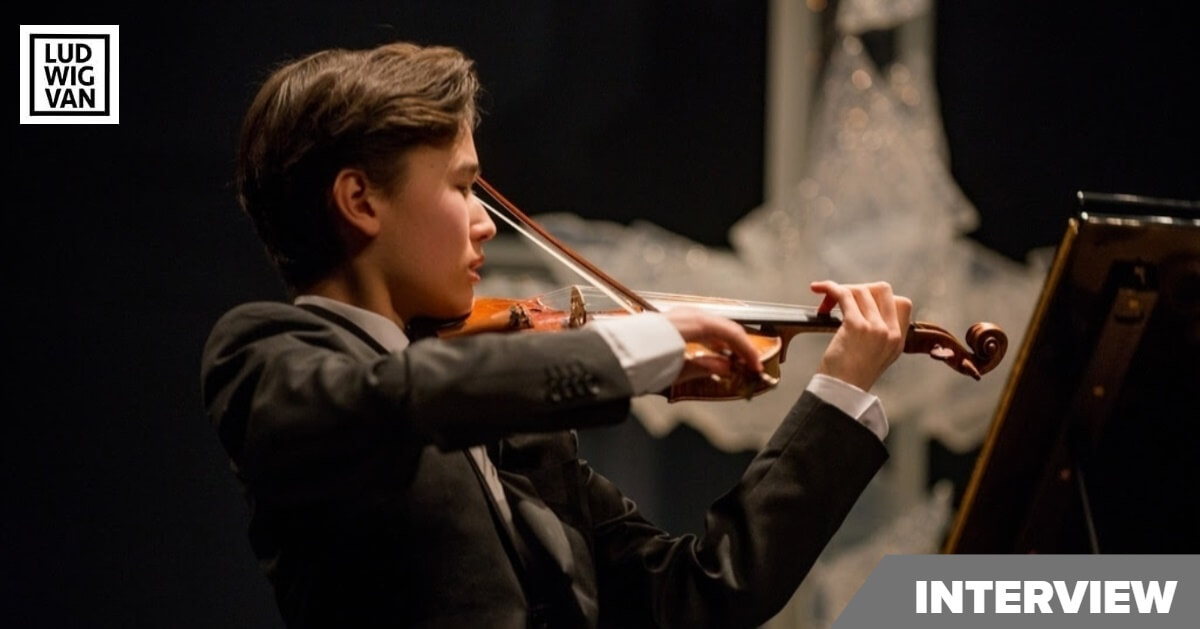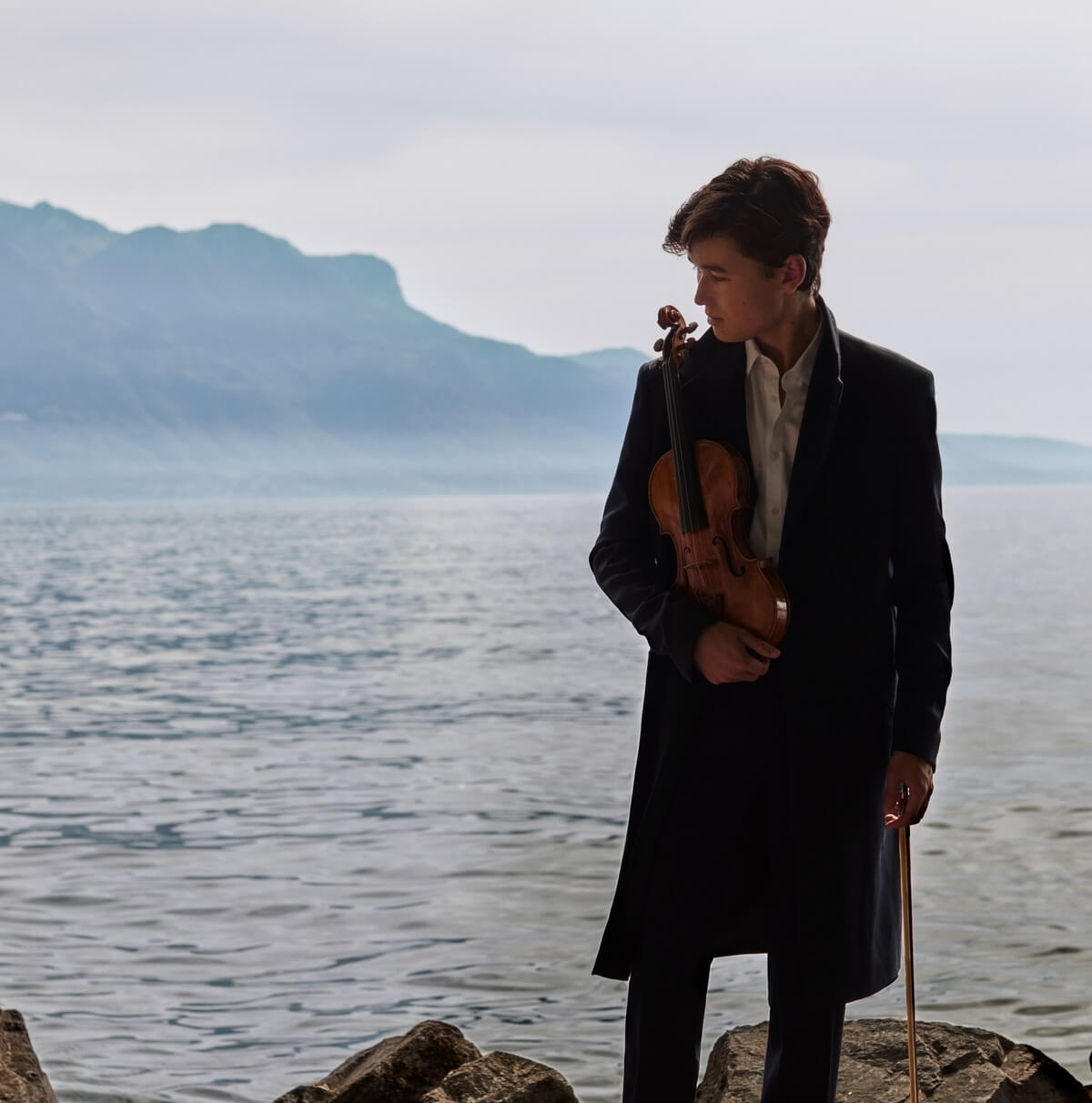Young virtuoso violinist Daniel Lozakovich talks to us about tackling Tchaikovsky’s notoriously difficult concerto, his teachers, and falling in love with the violin at age six.

“Tchaikovsky’s is one of the biggest violin concertos ever written, and one of the most difficult physically.”
Teenage virtuoso Daniel Lozakovich is talking about the notoriously challenging Tchaikovsky Violin Concerto he’ll be performing with the Toronto Symphony Orchestra from Nov. 27 to Dec. 1 as part of their annual All-Tchaikovsky bill. Also on the program is the blockbuster 1812 Overture, along with the seldom performed Symphony No. 1 “Winter Dreams”.
The program suits the young violinist perfectly. His all-Tchaikovsky recording, Tchaikovsky: None But The Lonely Heart, was released on the Deutsche Grammophon label Oct. 18, 2019 with Vladimir Spivakov conducting the Russian National Philharmonic orchestra. It includes the Violin Concerto along with Méditation for violin and orchestra and arrangements of two vocal works, Lensky’s Aria from Eugene Onegin and the romantic Op.6 No.6, “None but the lonely heart”. It’s Daniel’s second release with DG, the label he signed with in 2016 at the age of 15.
Daniel made his orchestral debut with Spivakov and the Moscow Virtuosi Chamber Orchestra at age nine. Since then, he’s gone on to play with orchestras and chamber ensembles across Europe, including the Orchestre national de France, the Royal Stockholm Philharmonic, Vienna Chamber Orchestra, Moscow Philharmonic, and the National Philharmonic of Russia, among others.
Among his many accolades are the 1st prize at the 2016 Vladimir Spivakov International Violin Competition, and both the 1st Prize and the Grand Prix at the 2012 EMCY international music competition.
Daniel began playing in 2007. “I was 6 1/2 — maybe 7,” he says. His family, while appreciating music, did not include any musicians. “Not at all,” he explains, “completely not musical at all.” It was the qualities of the violin itself that drew him into music. “The first time I saw it, I just knew I was going to be a violinist.” He recalls listening to a performance at a very early age. “The sound struck me — I even had tears in my eyes.”
Such singular focus is unusual in preschoolers, to say the least, but his parents were foresighted enough to get behind it. “I was lucky,” he says. Still, getting his parents on board wasn’t without its ups and downs. “In the beginning, they were shocked,” he says. “No one wants to have a beginner violinist in their home.” His mother, he says, saw him more as a professional tennis player. Eventually, however, he won them over.

Daniel acknowledges the importance of his teachers in his success, and says the fact they were Russian trained was happenstance. “When I was looking for a teacher, it just happened that way.” Nonetheless, their influence has played a role in what Daniel sees as his affinity for Russian music in particular.
He credits Eduard Wulfson in Geneva and Professor Josef Rissin of the Karlsruhe University of Music with developing more than his musical abilities. “Also as a person,” he says. “The teacher is the most important,” he says of the role. “It keeps you in shape, even when you have a bad day.”
For Daniel, Tchaikovsky’s Concerto is a welcome challenge. He notes that Tchaikovsky himself could not play violin. He didn’t necessarily understand the physical limitations. “Some passages were not very comfortable,” he says. But, as always, the technical difficulty is at the service of Tchaikovsky’s lyricism. “There is this kind of stuff, that it is not necessarily good for violin,” Daniel says, “but it is good for music. Technique should help — everything is for the music.”
The Violin Concerto in D major, op. 35 is composed of three movements, the Allegro moderato, Canzonetta: Andante, and Finale: Allegro vivacissimo. It is the Russian composer’s only violin concerto. In contrast to many of Tchaikovsky’s works, his Violin Concerto was written in a seamless spark of inspiration, untroubled by his frequent bouts of depression and personal problems.
Tchaikovsky wrote the concerto in 1878. On the rebound from an unhappy marriage, he met up with violinist Joseph Kotek in Switzerland. It was playing with Kotek that inspired him to write the concerto. In contrast to the torturous genesis of many of his works, the Violin Concerto was completed in short order, with the sketches done in only 11 days, and the scoring in about two weeks.
Despite Kotek’s help, Tchaikovsky dedicated the piece to the renowned violinist Leopold Auer. When it came time to perform the work, however, both violinists refused, saying the work was unplayable. Kotek and violinist Emile Sauret attempted to play it unsuccessfully. After working on it with Kotek, Tchaikovsky rewrote the Andante movement.
According to the Tchaikovsky Research Institute, American violinist Leopold Damrosch played a version scored for violin and piano at a private concert in New York City in 1879. It eventually debuted publicly in Europe in a performance by Adolf Brodsky on December 4, 1881 with the Vienna Philharmonic to mixed reviews.
For Daniel, the ultimate challenge is not technique, but interpretation. “To find your own sound in the concerto,” he explains.
Daniel talks about the concerto and his live recording with the National Philharmonic Orchestra of Russia with conductor Vladimir Spivakov.
Slavic and Russian folk melodies weave their way in and out of the piece, most notably in the last movement. “It’s such a Russian celebration,” Daniel says. “It’s one of my favourite concertos.” Born in Stockholm to natives of the former Soviet Republic, background also plays into his preferences. “Us, being Russian, it’s a very proud moment.”
Daniel is currently in the middle of a North American tour, with a stop for four dates in Boston at the Symphony Hall until Nov. 26. He arrives in Toronto the day of his first concert with the Toronto Symphony on Nov. 27. Then, he’s off to Portugal as the first stop of a European tour that takes him from the Netherlands to Spain into February 2020.
Life on the road has always been Daniel’s reality. “For me, it’s normal,” he says. “I just have special routines for practice.”
Despite the Russian focus and flavour of Tchaikovsky’s repertoire, however, Daniel sees the composer’s universal appeal. “He has these melodies, such heart wrenching moments, that it connects with everyone.” Tchaikovsy wrote for the people — his audiences — and not rich patrons, he points out. “Music was his only release.”
The Toronto Symphony Orchestra All-Tchaikovsky with conductor Simon Rivard and soloist Daniel Lozakovich, Nov. 27 to Dec. 1 features Tchaikovsky: Symphony No. 1 “Winter Dreams”; Tchaikovsky: Violin Concerto; Tchaikovsky: 1812 Overture. Details here.
#LUDWIGVAN
Want more updates on classical music and opera news and reviews? Follow us on Facebook, Instagram or Twitter for all the latest.
- THE SCOOP | The Glenn Gould Foundation Receives $12 Million Funding In Federal Budget - April 19, 2024
- THE SCOOP | Conductor Yannick Nézet-Séguin Receives Honorary Fellowship From Royal Conservatory - April 19, 2024
- INTERVIEW | Larry Weinstein Talks About His Film Beethoven’s Nine: Ode To Humanity, Premiering At Hot Docs - April 18, 2024



